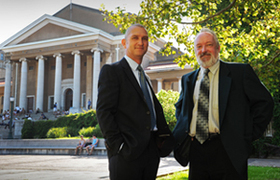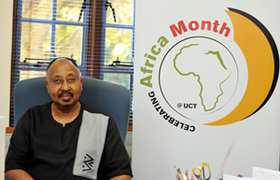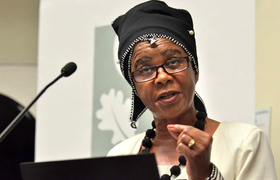Fund allocation bails out rated researchers
11 May 2009Vice-chancellor Dr Max Price has allocated special funds to assist the university's beleaguered National Research Foundation-rated researchers, who lost out on incentive funding because of budget cuts that affected the NRF.
Many of UCT's prominent researchers were compromised, as well as younger staff who have shown promise of becoming established researchers within the next rating cycle. Those who have not yet been funded through the NRF's Incentive Programme will now be able to apply to the University Research Committee (URC) for their NRF equivalent for 2009.
Two years ago the NRF announced that the rating of researchers and the funding they received from the foundation would be linked, as was the case in the past. Deputy vice-chancellor Professor Danie Visser said that the re-linking of rating and funding had been the biggest policy change at the NRF in 12 years.
When the re-linking was effected, both the Department of Science and Technology (DST) and the NRF expected that government would allocate the necessary funds. But the Treasury allocation was much lower than anticipated, leaving many of the country's top researchers in the lurch.
"It would have been difficult to manage even if the funding that had been anticipated had been forthcoming, but because of the budget cut by Treasury (which surprised the DST as much as the NRF) the difficulty was greatly increased, and temporary solutions had to be developed on the trot," Visser said.
The budget cut was announced after the call for incentive funding had already gone out.
But there are further complications. On the one hand, new Focus Area applications, one of the major sources of funding for rated researchers, are not being called by the NRF in order to enable it to fund the rated researchers.
On the other, sufficient money has not yet been 'clawed back' from the Focus Areas to fund all the rated researchers.
Of the special allocation announced by the vice-chancellor, Visser said: "This is a once-off allocation and it is hoped that the NRF will be able to improve its financial position in 2010."
After meeting with NRF acting president Dr Albert van Jaarsveld, Visser said it was "not unrealistic" to expect that the NRF's incentive funding would be rolled out fully by 2011.
"UCT may have to consider a further, smaller, once-off allocation next year. But that possibility can only be assessed next year in the light of conditions prevailing then."
The vice-chancellor's allocation for rated researchers who have not yet received funds through the NRF Incentive Programme will be processed on the basis of a simple application to the University Research Committee. Forms have been created for this purpose by the Research Office.
"I think these awards will go a long way to emphasise how much the University values researchers' participation in the NRF rating process, which remains a benchmark of excellence and international competitiveness," said Dr Marilet Sienaert, director of the Research Office.
"And we've been very mindful of the impact this gap in funding had on their research output and on their work with students."
Price also announced that a once-off extra R1.5 million had been allocated for master's scholarships, over and above the additional R1.2 million given to postgraduate scholarships for 2009. This had been decided after an unexpected rise in applications, which doubled to 720 last year, and will enable the University to provide enhanced support over and above the financial assistance provided to 370 master's students to date.
(The Research Office has sent out letters and application forms to NRF-rated researchers who have not yet received funding from the NRF Incentive Programme. The form - and queries - can be directed to Christina Pather at the Research Office, on ext 2434.)
 This work is licensed under a Creative Commons Attribution-NoDerivatives 4.0 International License.
This work is licensed under a Creative Commons Attribution-NoDerivatives 4.0 International License.
Please view the republishing articles page for more information.










